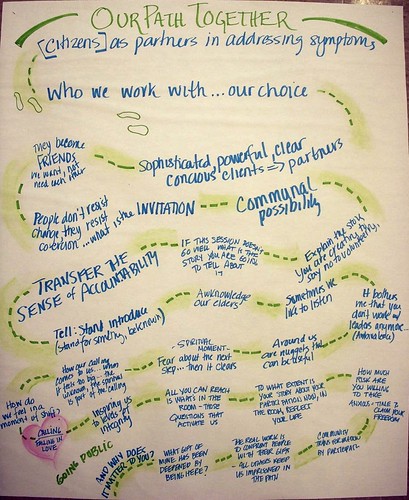 Flickr Photo Download: Nancy White graphs Peter Blockís Presentation Haven’t been browsing much during my three weeks away, so this week’s list is the articles that have been sent to me or have showed up in my RSS feeds since April 5: Love, Conversation, Community: Hands-on Survey of Intentional Communities: Three activists made a 7-month journey through 11 European intentional communities, to explore the question of whether intentional communities can actually make a difference or are just people running away from the ‘real’ world. Peter Block on Engaging People in Community: Nancy White graphs (see graphic above) Peter Block’s process for finding and inspiring passion in partners in your communities. And more thoughts on convening from Block, from Holger Nauheimer’s blog:
Aussie Intentional Community Profiled: Jindibah reveals how it has learned to achieve consensus and resolve conflicts quickly and amicably, largely by teaching members to know themselves better. Preconditions for Collective Change: Geoff Brown lists 9 factors that are needed to convert collective agreement into collective action. And he follows it up with a great round-up from some of the world’s best blogs. Ben Zander of the Boston Philharmonic on Leadership: Interesting speech on why people would rather be members of an effective team than its ‘leader’; thanks to Jon Husband for the link. May 10 is Pangea Day: Get together with the whole world and watch; thanks to Patti Digh for the link. Narrative and Storytelling: Preparing for Civilization’s End: A Billion Hybrids On the Road: How we get lulled into believing we’re making a difference in CO2 emissions when we’re not. When Governments Prevent Citizens from Suing Corporatists: The Bush regime is trying to protect its corporatist friends from liability for their atrocities against citizens and consumers by granting blanket legal indemnity for negligence and fraud, industry by industry. A Compelling Argument for Canceling the Olympics Permanently: It’s become a political, corporate-sponsored freakshow, with money, drug use, bribery and fraud determining the winners. Female Victims of the Cycle of Violence: Central American girls willingly suffer horrific abuse just so they can belong — to a gang of killers. Michael Pollan Urges Us to Grow Our Own Food: The famous sustainable, responsible food champion says foods from personal ‘victory gardens’ not only taste better and save energy, money and the environment, but help us become more self-sufficient as well. Making Everyone an Environmentalist: Alternet provides 8 reasons we will all soon be environmentalists, like it or not. More Chinese Poisons: A blood thinner used for dialysis and other medical purposes all over the world is tainted with toxins from — guess where — China again. Another Condemnation of the US Institutional Education System: Uncompetitive, obsolete, and sinking fast. Climate Change: Just Do Something. Nukes are No Answer: It’s not if, it’s when the next Chernobyl will hit. And in themeantime, taxpayers will foot the bill in subsidies and guarantees for hundreds of insanely expensive, dirty and dangerous nuclear plants. As Arctic Melts, Land Poisons Become Water Poisons: Mercury and other toxins are entering the arctic food system through melting permafrost. April was, Apparently, Animal Cruelty Month: Canadian Seal Hunt 2008: Another year of carnage, carefully hidden from public view, courtesy of the Harper government. Torturing Animals for Botox: Lots of better ways to test chemicals exist, but US regulators prefer antiquated, brutal methods. The Cost of Factory Farms: Subsidized CAFOs (Confined Animal Feeding Operations) not only inflict horrific cruelty on animals, they cost taxpayers a fortune, and the externalized cost we’ll pay in the future is massive. PETA Offers a Million for Humane Meat: PETA is offering a million dollar prize to anyone who can invent a way to clone meat commercially in test tubes. Web 2.0: Will Video Demand Collapse the Internet?: A British study suggests Web infrastructure is inadequate to support wide-spread use of video; thanks to David Jones for the link. Thoughts for the Week: Richard Conniff suggests we stop calling what we pay for government services ‘taxes’ and start calling it ‘dues’. And David Abram explains The Ecology of Magic. |
Navigation
Collapsniks
Albert Bates (US)
Andrew Nikiforuk (CA)
Brutus (US)
Carolyn Baker (US)*
Catherine Ingram (US)
Chris Hedges (US)
Dahr Jamail (US)
Dean Spillane-Walker (US)*
Derrick Jensen (US)
Dougald & Paul (IE/SE)*
Erik Michaels (US)
Gail Tverberg (US)
Guy McPherson (US)
Honest Sorcerer
Janaia & Robin (US)*
Jem Bendell (UK)
Mari Werner
Michael Dowd (US)*
Nate Hagens (US)
Paul Heft (US)*
Post Carbon Inst. (US)
Resilience (US)
Richard Heinberg (US)
Robert Jensen (US)
Roy Scranton (US)
Sam Mitchell (US)
Tim Morgan (UK)
Tim Watkins (UK)
Umair Haque (UK)
William Rees (CA)
XrayMike (AU)
Radical Non-Duality
Tony Parsons
Jim Newman
Tim Cliss
Andreas Müller
Kenneth Madden
Emerson Lim
Nancy Neithercut
Rosemarijn Roes
Frank McCaughey
Clare Cherikoff
Ere Parek, Izzy Cloke, Zabi AmaniEssential Reading
Archive by Category
My Bio, Contact Info, Signature Posts
About the Author (2023)
My Circles
E-mail me
--- My Best 200 Posts, 2003-22 by category, from newest to oldest ---
Collapse Watch:
Hope — On the Balance of Probabilities
The Caste War for the Dregs
Recuperation, Accommodation, Resilience
How Do We Teach the Critical Skills
Collapse Not Apocalypse
Effective Activism
'Making Sense of the World' Reading List
Notes From the Rising Dark
What is Exponential Decay
Collapse: Slowly Then Suddenly
Slouching Towards Bethlehem
Making Sense of Who We Are
What Would Net-Zero Emissions Look Like?
Post Collapse with Michael Dowd (video)
Why Economic Collapse Will Precede Climate Collapse
Being Adaptable: A Reminder List
A Culture of Fear
What Will It Take?
A Future Without Us
Dean Walker Interview (video)
The Mushroom at the End of the World
What Would It Take To Live Sustainably?
The New Political Map (Poster)
Beyond Belief
Complexity and Collapse
Requiem for a Species
Civilization Disease
What a Desolated Earth Looks Like
If We Had a Better Story...
Giving Up on Environmentalism
The Hard Part is Finding People Who Care
Going Vegan
The Dark & Gathering Sameness of the World
The End of Philosophy
A Short History of Progress
The Boiling Frog
Our Culture / Ourselves:
A CoVid-19 Recap
What It Means to be Human
A Culture Built on Wrong Models
Understanding Conservatives
Our Unique Capacity for Hatred
Not Meant to Govern Each Other
The Humanist Trap
Credulous
Amazing What People Get Used To
My Reluctant Misanthropy
The Dawn of Everything
Species Shame
Why Misinformation Doesn't Work
The Lab-Leak Hypothesis
The Right to Die
CoVid-19: Go for Zero
Pollard's Laws
On Caste
The Process of Self-Organization
The Tragic Spread of Misinformation
A Better Way to Work
The Needs of the Moment
Ask Yourself This
What to Believe Now?
Rogue Primate
Conversation & Silence
The Language of Our Eyes
True Story
May I Ask a Question?
Cultural Acedia: When We Can No Longer Care
Useless Advice
Several Short Sentences About Learning
Why I Don't Want to Hear Your Story
A Harvest of Myths
The Qualities of a Great Story
The Trouble With Stories
A Model of Identity & Community
Not Ready to Do What's Needed
A Culture of Dependence
So What's Next
Ten Things to Do When You're Feeling Hopeless
No Use to the World Broken
Living in Another World
Does Language Restrict What We Can Think?
The Value of Conversation Manifesto Nobody Knows Anything
If I Only Had 37 Days
The Only Life We Know
A Long Way Down
No Noble Savages
Figments of Reality
Too Far Ahead
Learning From Nature
The Rogue Animal
How the World Really Works:
Making Sense of Scents
An Age of Wonder
The Truth About Ukraine
Navigating Complexity
The Supply Chain Problem
The Promise of Dialogue
Too Dumb to Take Care of Ourselves
Extinction Capitalism
Homeless
Republicans Slide Into Fascism
All the Things I Was Wrong About
Several Short Sentences About Sharks
How Change Happens
What's the Best Possible Outcome?
The Perpetual Growth Machine
We Make Zero
How Long We've Been Around (graphic)
If You Wanted to Sabotage the Elections
Collective Intelligence & Complexity
Ten Things I Wish I'd Learned Earlier
The Problem With Systems
Against Hope (Video)
The Admission of Necessary Ignorance
Several Short Sentences About Jellyfish
Loren Eiseley, in Verse
A Synopsis of 'Finding the Sweet Spot'
Learning from Indigenous Cultures
The Gift Economy
The Job of the Media
The Wal-Mart Dilemma
The Illusion of the Separate Self, and Free Will:
No Free Will, No Freedom
The Other Side of 'No Me'
This Body Takes Me For a Walk
The Only One Who Really Knew Me
No Free Will — Fightin' Words
The Paradox of the Self
A Radical Non-Duality FAQ
What We Think We Know
Bark Bark Bark Bark Bark Bark Bark
Healing From Ourselves
The Entanglement Hypothesis
Nothing Needs to Happen
Nothing to Say About This
What I Wanted to Believe
A Continuous Reassemblage of Meaning
No Choice But to Misbehave
What's Apparently Happening
A Different Kind of Animal
Happy Now?
This Creature
Did Early Humans Have Selves?
Nothing On Offer Here
Even Simpler and More Hopeless Than That
Glimpses
How Our Bodies Sense the World
Fragments
What Happens in Vagus
We Have No Choice
Never Comfortable in the Skin of Self
Letting Go of the Story of Me
All There Is, Is This
A Theory of No Mind
Creative Works:
Mindful Wanderings (Reflections) (Archive)
A Prayer to No One
Frogs' Hollow (Short Story)
We Do What We Do (Poem)
Negative Assertions (Poem)
Reminder (Short Story)
A Canadian Sorry (Satire)
Under No Illusions (Short Story)
The Ever-Stranger (Poem)
The Fortune Teller (Short Story)
Non-Duality Dude (Play)
Your Self: An Owner's Manual (Satire)
All the Things I Thought I Knew (Short Story)
On the Shoulders of Giants (Short Story)
Improv (Poem)
Calling the Cage Freedom (Short Story)
Rune (Poem)
Only This (Poem)
The Other Extinction (Short Story)
Invisible (Poem)
Disruption (Short Story)
A Thought-Less Experiment (Poem)
Speaking Grosbeak (Short Story)
The Only Way There (Short Story)
The Wild Man (Short Story)
Flywheel (Short Story)
The Opposite of Presence (Satire)
How to Make Love Last (Poem)
The Horses' Bodies (Poem)
Enough (Lament)
Distracted (Short Story)
Worse, Still (Poem)
Conjurer (Satire)
A Conversation (Short Story)
Farewell to Albion (Poem)
My Other Sites








 One of the challenges of being
One of the challenges of being 


